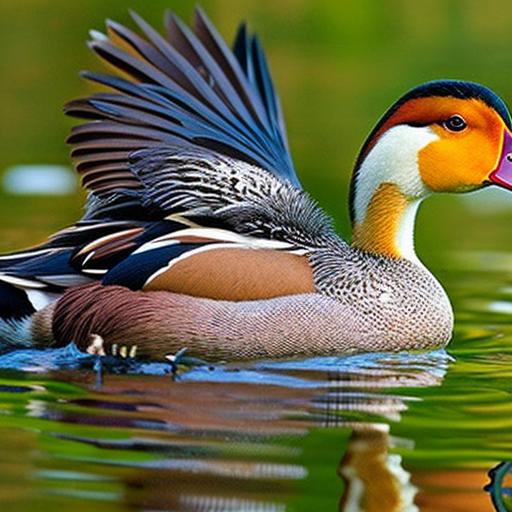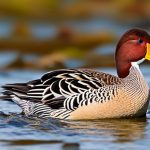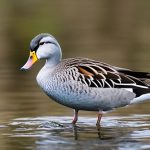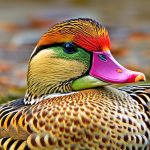Domesticated ducks have a long history dating back thousands of years. They were first domesticated in Asia and were primarily kept for their meat and eggs. Over time, different breeds of ducks were developed for specific purposes, such as meat production, egg laying, or ornamental purposes. Today, backyard duck keeping is gaining popularity as more people are discovering the joys and benefits of raising these feathered friends.
Backyard duck keeping offers a unique and rewarding experience for individuals and families alike. Ducks are known for their friendly and curious nature, making them delightful companions. They also provide a range of practical benefits, such as fresh eggs, natural pest control, and fertilizer for your garden. With the right breed and setup, raising ducks in your backyard can be a fulfilling and enjoyable endeavor.
Key Takeaways
- Backyard duck breeds are becoming increasingly popular among hobby farmers and urban homesteaders.
- Popular breeds for backyard duck keeping include Pekin, Muscovy, and Khaki Campbell.
- Raising ducks in your backyard can provide benefits such as fresh eggs, pest control, and fertilizer production.
- When choosing a breed for your backyard setup, consider factors such as space, climate, and intended use.
- Understanding the temperament and behavior of different duck breeds can help you choose the right fit for your family and lifestyle.
Popular breeds for backyard duck keeping
There are several popular breeds of ducks that are well-suited for backyard keeping. Each breed has its own unique characteristics and qualities that make them desirable for different purposes. Here are some of the most popular breeds:
1. Pekin ducks: Pekin ducks are one of the most common breeds found in backyard flocks. They are large, white ducks with a calm and friendly temperament. Pekin ducks are excellent layers, producing around 200-300 eggs per year. They also grow quickly and have tender meat, making them a popular choice for those interested in both eggs and meat production.
2. Muscovy ducks: Muscovy ducks are known for their distinctive appearance, with males having red wattles and caruncles on their face. They are larger than most other duck breeds and have a unique flavor to their meat. Muscovy ducks are also excellent foragers and can help control pests in your yard or garden.
3. Khaki Campbell ducks: Khaki Campbell ducks are highly regarded for their exceptional egg-laying abilities. They are small to medium-sized ducks with a khaki-colored plumage. Khaki Campbells can lay up to 300-350 eggs per year, making them a top choice for those primarily interested in egg production.
4. Runner ducks: Runner ducks are known for their upright posture and distinctive running gait. They come in a variety of colors and patterns and are highly active and energetic. Runner ducks are excellent foragers and can help control pests in your yard or garden. They also lay a good number of eggs, although not as many as Khaki Campbells.
5. Rouen ducks: Rouen ducks are often mistaken for wild mallards due to their similar appearance. They have a beautiful plumage with shades of green, brown, and gray. Rouen ducks are larger than most other duck breeds and have flavorful meat. While they may not be the most prolific egg layers, they make up for it with their stunning appearance and delicious meat.
Benefits of raising ducks in your backyard
Raising ducks in your backyard offers a range of benefits that make it an appealing endeavor for many people. Here are some of the key benefits:
1. Fresh eggs and meat: One of the main reasons people choose to raise ducks is for their fresh eggs and meat. Duck eggs are larger than chicken eggs and have a richer flavor. They are also prized by bakers for their ability to create light and fluffy baked goods. Additionally, certain duck breeds, such as Pekin and Muscovy ducks, have tender and flavorful meat that is highly sought after.
2. Natural pest control: Ducks are excellent foragers and can help control pests in your yard or garden. They eat insects, slugs, snails, and other small creatures that can damage plants or spread diseases. By allowing your ducks to roam freely in your yard or garden, you can reduce the need for chemical pesticides and promote a healthier ecosystem.
3. Fertilizer for your garden: Duck manure is a valuable source of organic fertilizer. It is rich in nitrogen, phosphorus, and potassium, which are essential nutrients for plant growth. By keeping ducks in your backyard, you can collect their manure and use it to fertilize your garden, promoting healthy and abundant plant growth.
4. Entertainment and companionship: Ducks are social and curious animals that can provide endless entertainment and companionship. They have unique personalities and behaviors that can be fascinating to observe. Whether it’s watching them splash around in a pond or waddling around the yard, ducks can bring joy and laughter to your everyday life.
Choosing the right breed for your backyard setup
When choosing a breed of duck for your backyard setup, there are several factors to consider, including space, climate, noise level, and your goals for raising ducks. Here are some tips to help you make the right choice:
1. Consider space: Ducks require ample space to roam and forage. If you have a small backyard, you may want to consider smaller breeds like Khaki Campbells or Runner ducks that are more active and require less space. On the other hand, if you have a larger property with plenty of room, you can consider larger breeds like Pekin or Muscovy ducks.
2. Climate: Different duck breeds have different tolerances to heat and cold. Some breeds, like Muscovy ducks, are more cold-hardy and can withstand colder temperatures. Others, like Pekin ducks, are more heat-tolerant and may struggle in extreme heat. Consider the climate in your area and choose a breed that is well-suited to the conditions.
3. Noise level: Ducks can be noisy animals, especially during breeding season or when they feel threatened. If you live in an urban or suburban area with close neighbors, you may want to choose a breed that is known for being quieter, such as Khaki Campbells or Runner ducks. Muscovy ducks, on the other hand, are known for their loud hissing and honking sounds.
4. Determine your goals: Before choosing a breed, it’s important to determine your goals for raising ducks. Are you primarily interested in egg production, meat production, or simply having ducks as pets? Different breeds have different strengths and weaknesses in these areas. For example, if you want a high egg production, Khaki Campbell ducks are an excellent choice. If you want tender and flavorful meat, Pekin or Muscovy ducks are the way to go.
Understanding the temperament and behavior of different duck breeds
Each duck breed has its own unique temperament and behavior traits. Some breeds are more social and friendly, while others are more independent or skittish. Understanding these differences can help you choose a breed that aligns with your preferences and lifestyle. Here are some key points to consider:
1. Social and friendly breeds: If you’re looking for ducks that will be friendly and enjoy human interaction, breeds like Pekin ducks and Khaki Campbell ducks are good choices. These breeds are known for their sociable nature and often enjoy being around people. They can be easily trained and may even seek out attention or affection.
2. Independent breeds: On the other hand, some duck breeds are more independent and may not seek as much human interaction. Muscovy ducks, for example, are known for their self-sufficiency and ability to forage on their own. While they can still be friendly towards humans, they may not be as affectionate or seek out attention in the same way as other breeds.
3. Skittish breeds: Some duck breeds are naturally more skittish or nervous around humans. Runner ducks, for example, are known for their high energy and tendency to be easily startled. They may not enjoy being handled or petted as much as other breeds. If you prefer ducks that are more calm and relaxed, you may want to consider breeds like Pekin or Khaki Campbell ducks.
4. Active and energetic breeds: If you have a large backyard or ample space for your ducks to roam, you may want to consider breeds that are more active and energetic. Runner ducks, for example, are known for their active nature and love for running and exploring. They require plenty of space to roam and may become bored or restless if confined to a small area.
Best duck breeds for egg production
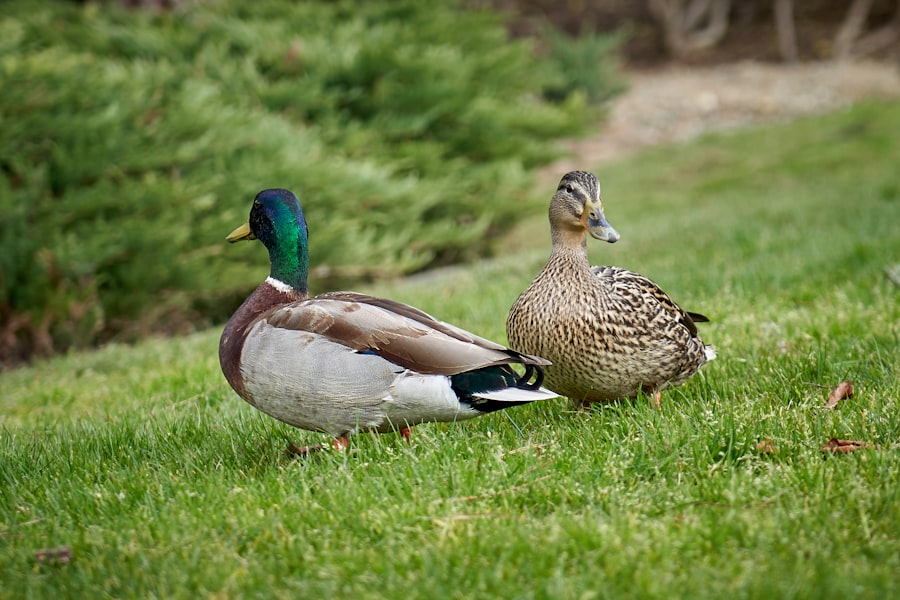
If your primary goal for raising ducks is egg production, there are several breeds that excel in this area. Here are some of the best duck breeds for egg production:
1. Khaki Campbell ducks: Khaki Campbell ducks are renowned for their exceptional egg-laying abilities. They can lay up to 300-350 eggs per year, making them one of the most prolific layers among duck breeds. Khaki Campbell eggs are also larger than chicken eggs and have a rich flavor.
2. Runner ducks: While not as prolific as Khaki Campbells, Runner ducks are still excellent layers, producing around 150-200 eggs per year. They are known for their slender and upright posture, which gives them a distinctive appearance. Runner duck eggs are also larger than chicken eggs and have a rich flavor.
3. Welsh Harlequin ducks: Welsh Harlequin ducks are a relatively new breed that has gained popularity for their excellent egg-laying abilities. They can lay up to 250-300 eggs per year, making them a top choice for those interested in egg production. Welsh Harlequin eggs are slightly smaller than Khaki Campbell eggs but still have a delicious flavor.
Best duck breeds for meat production
If you’re primarily interested in raising ducks for meat production, there are several breeds that are known for their tender and flavorful meat. Here are some of the best duck breeds for meat production:
1. Pekin ducks: Pekin ducks are the most common breed used for meat production. They have a large size and grow quickly, making them ideal for meat production. Pekin ducks have tender and flavorful meat that is highly sought after by chefs and home cooks alike.
2. Muscovy ducks: Muscovy ducks are known for their unique flavor and tender meat. They have a leaner meat compared to other duck breeds, which some people prefer. Muscovy ducks also have a higher yield of breast meat, making them a popular choice for those interested in meat production.
3. Rouen ducks: Rouen ducks are often used for both meat and exhibition purposes. They have a beautiful plumage and flavorful meat that is similar to wild mallards. While they may not grow as quickly as Pekin ducks, Rouen ducks are still a good choice for those interested in raising ducks for meat.
Unique and rare backyard duck breeds to consider
While the popular duck breeds mentioned earlier are well-suited for backyard keeping, there are also some unique and rare breeds that you may want to consider if you’re looking for something different. Here are a few examples:
1. Cayuga ducks: Cayuga ducks are known for their stunning black plumage with iridescent green highlights. They are medium-sized ducks with a calm and friendly temperament. Cayuga ducks are excellent layers and can produce around 100-150 eggs per year.
2. Ancona ducks: Ancona ducks have a distinctive appearance with their mottled black and white plumage. They are medium-sized ducks with a friendly and sociable nature. Ancona ducks are good layers, producing around 150-200 eggs per year.
3. Swedish ducks: Swedish ducks, also known as Blue Swedish ducks, have a beautiful blue-gray plumage. They are medium-sized ducks with a calm and friendly temperament. Swedish ducks are good layers, producing around 100-150 eggs per year.
Tips for caring for backyard ducks and their specific needs
Caring for backyard ducks requires some knowledge and preparation to ensure their health and well-being. Here are some tips for caring for backyard ducks and meeting their specific needs:
1. Housing and bedding: Ducks need a safe and secure shelter to protect them from predators and the elements. The housing should be spacious enough to allow them to move around comfortably and have access to fresh air and sunlight. Provide bedding such as straw or wood shavings to keep the housing clean and dry.
2. Feeding and watering: Ducks require a balanced diet that includes a combination of commercial duck feed, fresh greens, and insects. Make sure they have access to clean water at all times, as ducks need water for drinking, bathing, and preening. Use a shallow dish or container that is large enough for them to dip their bills in.
3. Health and hygiene: Regularly check your ducks for signs of illness or injury. Provide them with regular veterinary care, including vaccinations and deworming. Keep their housing clean and provide regular access to fresh water for bathing and preening, as this helps maintain their feather health.
4. Predators and safety: Ducks are vulnerable to predators such as raccoons, foxes, and birds of prey. Make sure their housing is secure with sturdy fencing or wire mesh to keep predators out. Provide them with a safe outdoor area to roam during the day, but supervise them to ensure their safety.
The joys and rewards of backyard duck keeping
Raising ducks in your backyard can be a rewarding and enjoyable experience. From the fresh eggs and meat they provide to the natural pest control and fertilizer they offer, ducks offer a range of practical benefits. They also provide entertainment and companionship, with their friendly and curious nature. By choosing the right breed for your backyard setup and understanding their specific needs, you can create a thriving and happy flock of ducks in your own backyard. So why not consider raising backyard ducks and experience the joys and rewards for yourself?
If you’re interested in backyard duck breeds, you might also want to check out this informative article on creating the perfect chicken coop in Muskegon. It provides valuable insights and tips on designing a coop that is not only functional but also aesthetically pleasing. Whether you’re looking for ideas for a large chicken coop or need advice on installing a heater for your coop, this article has got you covered. To learn more, click here.
FAQs
What are backyard duck breeds?
Backyard duck breeds are domesticated ducks that are kept in a backyard setting for various purposes such as egg-laying, meat production, or as pets.
What are some common backyard duck breeds?
Some common backyard duck breeds include Pekin, Muscovy, Khaki Campbell, Rouen, and Indian Runner.
What is the difference between a Pekin duck and a Muscovy duck?
Pekin ducks are a type of domesticated duck that originated in China and are known for their white feathers and large size. Muscovy ducks, on the other hand, are a breed of duck that is native to South America and are known for their unique appearance, including a red, warty face and a black and white plumage.
What is the purpose of keeping backyard ducks?
Backyard ducks can be kept for various purposes such as egg-laying, meat production, or as pets. They are also known for their ability to control pests in the garden and provide natural fertilizer for plants.
What is the lifespan of a backyard duck?
The lifespan of a backyard duck can vary depending on the breed and the care it receives. On average, ducks can live up to 10 years.
What kind of housing do backyard ducks need?
Backyard ducks need a secure and dry shelter that protects them from predators and the elements. The shelter should also have enough space for the ducks to move around and lay eggs.
What do backyard ducks eat?
Backyard ducks can eat a variety of foods including commercial duck feed, grains, vegetables, and insects. It is important to provide them with a balanced diet that meets their nutritional needs.
Meet Walter, the feathered-friend fanatic of Florida! Nestled in the sunshine state, Walter struts through life with his feathered companions, clucking his way to happiness. With a coop that’s fancier than a five-star hotel, he’s the Don Juan of the chicken world. When he’s not teaching his hens to do the cha-cha, you’ll find him in a heated debate with his prized rooster, Sir Clucks-a-Lot. Walter’s poultry passion is no yolk; he’s the sunny-side-up guy you never knew you needed in your flock of friends!

